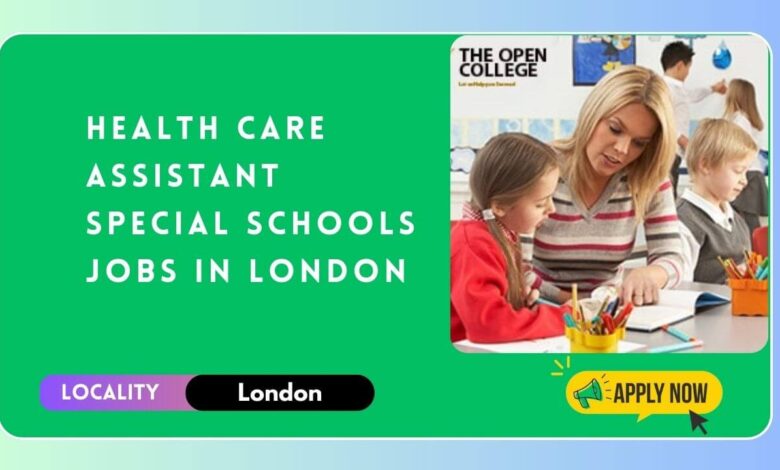Health Care Assistant Special Schools Jobs in London 2025

Our supportive team is currently in search of a Band 3 Health Care Assistant. Richard Cloudesley School, Samuel Rhodes School, and Bridge Academy, all special institutions in Islington, will employ the successful candidate. The three schools have all been rated as outstanding and provide support to children and adolescents with a diverse range of needs, such as physical disabilities, cognitive difficulties, and autism spectrum conditions.
Your primary responsibility will be to assist the school nursing staff in providing efficient, personalized support and care to children who attend school. Clinical responsibilities may encompass administering medication, providing support with health care plans, including epilepsy plans, and administering daily feeds through specialized feeding devices (nasogastric and gastrostomy).
You may provide support for tracheostomy care, suctioning, and other pertinent healthcare tasks. Under the guidance of a school nurse, you will assist students in implementing their health care plans. A school nurse will provide comprehensive training and support, and you will collaborate with a team of seasoned healthcare assistants.
The Health Care Assistant/Administrator, as a member of the Special Needs School Nursing Team, will facilitate the effective provision of personalized support and care to children enrolled in Special Schools in Islington. To offer a health service to children and adolescents, she or he will perform clinical and administrative responsibilities as directed.
The position will be located between Bridge Academy Primary and Secondary Schools, Richard Cloudesley Primary and Secondary Schools, and Samuel Rhodes Primary and Secondary Schools. It is critical to provide direct clinical support to children with their daily health care requirements, including the administration of gastrostomy feeds and medications, is a critical component of the position.
Additionally, they will be responsible for assisting the school nurse in clinic coordination, providing input and training to the entire school, establishing connections with other agencies, and assisting children with their health care plans. They may assist other departments or teams within the service in their administrative responsibilities. The school nurse will provide them with consistent supervision, and they will be required to attend in-service training and team meetings.
Check Also: Health and Care Worker Jobs in UK – Visa Sponsorship
Key Points:
- Job Title: Health Care Assistant Special Schools Jobs in London
- Company: NHS
- Job Type: Part-time
- Salary: £27,948 – £29,468 a year
- Location: London EC1Y
- Country: United Kingdom
About The Role:
The primary goal of the position will be to assist the children in meeting their health needs. Whittington Health is committed to ensuring that all of its services are equitable and accessible to a diverse population. This is most evident in the manner in which we manage our personnel.
We are committed to hiring a workforce that is as representative of this population as is feasible. Consequently, we are amenable to the value of differences in age, disability, gender, marital status, pregnancy and maternity, race, sexual orientation, and religion or belief.
The Trust believes that it is our responsibility as a public sector organization to establish recruitment, training, promotion, and other formal employment policies and procedures that are cognizant of these distinctions. We believe that this will enable us to provide superior patient care and create a more conducive work environment.
Role Responsibility:
- Maintaining confidentiality at all times, sharing information with team members as directed and appropriate, and being a part of the Special School multi-agency team are all essential.
- We access the electronic notes system (currently Rio) to ensure the accuracy of school records, and we file and organize the records in accordance with Whittington Health guidelines.
- Maintain current written and electronic records in accordance with Trust standards, with the assistance of the supervisor.
- Demonstrate respect for the cultural, religious, and individualities of children and their families, and assist in providing a service that is mindful of these requirements.
- Help team members establish communication with various agencies involved in the child’s care, including education, social services, and voluntary services.
- Establish professional relationships with children, families, and staff at children’s centers and engage in communication that is respectful of their culture, autonomy, and perspectives.
- To effectively communicate with children who are nonverbal, of a non-English-speaking origin, require an interpreter, have a hearing impairment, have altered emotional states, or have a cognitive, learning, or behavioral disability, a variety of verbal and non-verbal communication skills and tools are employed.
- As directed by team members, communicate with other agencies involved in the child’s care, such as relatives and caregivers, in a manner that is appropriate for the child’s requirements.
- Effectively communicate any issues or concerns to the supervisor or line manager.
- Effective communication with parents and caregivers and external agencies, particularly instructors and teaching assistants, should be demonstrated via telephone.
- To assist the school nurse or senior practitioner in the development of care programs for identified students.
- Provide and support the care of children with special needs, including the administration of medication, nutrition, and health promotion, at all school sites.
Clinical Responsibility:
- We arrange meetings with parents or caregivers for school medicals, dietician/professional consultations, and other essential appointments.
- When trained and evaluated as competent by the school nurse, they provide nursing care and engage in health care activities. This may involve administering medications, suctioning, adhering to the procedures outlined in the epilepsy care plan, nourishing children via gastrostomy, and engaging in other pertinent healthcare activities.
- To support individual pupils at the school with health care tasks such as suctioning, tracheostomy care, medication management, or other health care plans, once trained, other HCAs will provide cover.
- To conduct diagnostic procedures, including percentile calculations, for vision, hearing, and growth. The school nurse receives any concerns expressed by the parent, child, or school staff, or during the screening process.
- The goal is to assist in the planning and implementation of immunization programs in the educational setting.
- Under the supervision of senior team members and by local and trust policies, to aid in the completion of environmental and safety risk assessments
Leadership and Staff Management Responsibility
Review and reflect on one’s performance, burden, and practice by utilizing regular professional and operational supervision and appraisal effectively.
To conduct routine meetings with the school nurse to facilitate the development of work plans and solicit feedback. The school nurse will assign specific duties and responsibilities to this staff member once they have been trained and evaluated as competent.
Maintain a fundamental understanding of Moving and Handling Legislation, Infection Control, Clinical Supervision, and Child Protection, and adhere to the Trust’s Policies and Procedures. Refer any concerns to the school nurse or Team Leader.
Administrative Duties:
- To maintain accurate records of clients who adhere to the Service Policy.
- To participate in pertinent staff and service meetings.
- To cover administrative responsibilities, including photocopying, filing, and answering the telephone, as needed.
Financial Responsibility:
- Encourage team members to focus on stock issues.
- Service enhancement and development
- The individual executes the policies and procedures established by the Islington Additional Needs and Disability Service.
- Highlight service provision issues with the line manager to identify unmet requirements and gaps in service provision.
- Conduct surveys or audits as directed by the superintendent or line manager.
- Guarantee that work areas are well-maintained and adhere to Health and Safety Guidelines, thereby ensuring the safe use of equipment, cleansing, and material storage.
Communication:
- To provide close guidance and support to children and families in order to facilitate the attainment of their objectives
- The goal is to engage in consistent work with children and adolescents who are experiencing intricate emotional, social, and behavioral challenges.
- Identifying and reporting concerns related to safeguarding is crucial.
- To be able to complete the necessary work within the time frames and constraints established by the line manager or supervisor, which may be stressful at times.
- The goal is to address the distress of clients and their caregivers sensitively.
Physical Working Conditions and Environment:
Occasionally, assists with the transfer of children by employing apparatus such as wheelchairs and hoists.
Several brief periods throughout the day necessitate the use of lifting apparatus, such as hoists and transfer maneuvers, resulting in light to moderate effort.
Knowledge, Training, and Education:
- to take part in a structured induction program that aims to pinpoint learning needs
- Exhibit a fundamental comprehension of the impact of medical conditions on one’s ability to function.
- Have a fundamental understanding of the Moving and Handling Legislation, and implement manual handling principles by best practices.
- The goal is to participate in a particular area of induction training and education for students, individuals with work experience, and other pertinent personnel.
- Participate in all mandatory training sessions established by the department and the trust.
- To exhibit continuous personal development by participating in internal and available development opportunities and documenting learning outcomes in a portfolio (CPD).
- To guarantee that mandatory training remains current and relevant
- Participate in relevant activities to meet the supervisor’s set training objectives.
Benefits of Health Care Assistant Special Schools Jobs:
- Meaningful Work: HCAs in special schools provide essential support to children with disabilities or special needs, significantly improving their lives.
- Skills Development: This position contributes to the cultivation of a variety of abilities, such as communication, empathy, patience, and specialized care techniques that are customized to meet the unique requirements of children.
- Job Satisfaction: The work is highly rewarding as you assist children in achieving their educational and personal objectives, thereby contributing to their overall well-being and development.
- Professional Development: This field can offer additional career prospects in healthcare, education, or social work, as well as a strong foundation for pursuing advanced qualifications.
- Specialized Training: A multitude of specialized institutions provide tailored training programs for HCAs, which will increase your professional proficiency and render you more valuable in the job market.
- Team Collaboration: By establishing a collaborative environment, you can enhance your interpersonal and teamwork abilities by collaborating closely with healthcare professionals, instructors, and therapists.
- Diverse Work Environment: The position is dynamic and engaging, as you work with children with varying needs and conditions, and each day presents new challenges and opportunities.
- Supportive Work Environment: Special schools frequently establish a supportive work environment that prioritizes the well-being of employees, professional development, and team support.
- Flexibility in Work Schedules: Numerous special institutions provide part-time or flexible work hours, which can assist in reconciling personal obligations with professional obligations.
- Employment Stability: The demand for HCAs in special institutions is consistent, ensuring job security and stable employment prospects.
- Community Impact: Your efforts not only benefit the children under your care, but they also support their families and contribute to the broader community by promoting equality and inclusion.
- Learning Opportunities: The experience of working in special schools offers continuous learning opportunities regarding a variety of disabilities, educational strategies, and therapeutic interventions.
- Emotional Satisfaction: The development of strong, trusting relationships with the children and the observation of their progress and contentment can be profoundly emotional.
- Career Pathways: The experience and skills acquired can lead to a variety of career paths, such as special education, occupational therapy, speech therapy, or nursing.
- Positive Work Environment: Special schools frequently foster a positive and nurturing environment that fosters a sense of shared purpose and community among their staff.
- Parental Appreciation: Fostering strong relationships and a high level of appreciation from parents and caregivers can result from working closely with the families of the children.
- Diverse Populations: Cultural competence and comprehension of diverse life experiences are improved by exposure to a diverse array of conditions and backgrounds.
For More Info:
Email Your CV, and We’ll Find the Best Pathway For you: info@careassistantjobs.pk
Frequently Asked Questions:
How much does an HCA earn in London?
The estimated total pay for a healthcare assistant is £29,204 per year in the London area, with an average salary of £22,419 per year. These numbers represent the median, which is the midpoint of the ranges in our proprietary Total Pay Estimate model based on salaries collected from our users.
What qualifications are required to be a care assistant in the United Kingdom?
Employers expect good literacy and numeracy, and they may ask for GCSEs (or equivalent) in English and math. They may ask for a healthcare qualification, such as a BTEC or NVQ. Employers expect you to have some experience in healthcare or care work. This could be either paid or voluntary work.
What is the minimum wage for a healthcare assistant in the UK?
The average salary for a healthcare assistant is £29,204 per year in London, United Kingdom. The average additional cash compensation for a healthcare assistant in London, United Kingdom, is £6,784, with a range from £1,137 to £40,467.



